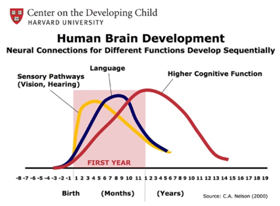Lesson 1: The Importance of Early Language & Literacy
Attention

Learning Outcomes
Upon completion of this lesson's material, students will be able to
-
Explain, in their own words, why language literacy and literature is important in early childhood, using the readings and guidelines
-
Explain how language and literacy development corresponds to other domains using the guidelines.
-
Explain in their own words, how different developmental factors influence language and literacy and how these factors impact their teaching practice.
Teaching

Did you know that 90% of a child’s critical brain development happens by age five? One of these critical brain developments that occur in early childhood is language development. In fact, the language that children develop at this time affects a child’s later success with literacy and communication. In addition to developing language connections, a young child’s brain is also wiring connections for other developmental domains. These other domains are sensory pathways (hearing and vision) and higher cognitive functioning (motor skills, problem solving and social emotional development).
One of the most important factors that influence language and literacy skills in early childhood is the emotional connections children build such as confidence and self-esteem. This is why it is important to help children develop a sense of competence and confidence to master new skills in the early years. To help support both emotional and language and literacy development, families, as well as educators, must be knowledgeable and intentional when working with children and create safe and trusting environments for children to explore and master these new skills.
Unfortunately, some families are not able to provide enriching learning environments that support and promote language and literacy development. Environmental factors such as limited access to books, parents’ lack of education, and low exposure to language can negatively impact a child’s language and literacy development. For example, a three-year-old who is part of a talkative family will have heard 30 million more words than children in less talkative families.
The unfortunate part is that these environmental factors not only affect early childhood language and literacy development, but also can affect their success with language and literacy later in life.
The question here is how do you, as an educator, promote language, literacy, and literature development and assure these children are set up for success? In this week’s lesson, you will learn more about how language and literacy is crucial to healthy childhood development and begin to use this information to make informed decisions about developing language and literacy in children.
To do this, first you will need to read and understand the state guidelines. By understanding the language and literacy milestones, you should be able use them to adjust your environment, activities, and interactions based on the child’s developmental needs.
For the assignments, you will need to read:
Assessment
Possible Class Discussion - Why is developing language and literacy important?
Choose one critical factor that you learned from this week’s lesson to discuss with the class. In your post, be sure to include:
- Why you think this factor is important for developing language and literacy in early childhood.
-
The stage of language and literacy this factor belongs to using the MITG and the MECLG
- How the knowledge you gained will impact your methods of practice with children in early care and education.
IMPORTANT NOTE ABOUT DISCUSSIONS: Remember, you must post your response to the discussion question and two reply posts for every discussion (For a total of THREE substantive posts). Your first post should address the topic of the discussion (like the one above) and your second posts must be replies other students' post. Keep in mind that your reply should be MORE than just a "I agree!" or "Very cool!" It should be "substantive" by expanding on the students post, asking a questions, adding your own thoughts to what they have said, etc. This applies to all discussions.
Lesson 1 Quiz
-
Explain in your own words why language, literacy, and literature are important in early childhood. Provide at least three reasons why they are important and use the readings and guidelines provided to support your explanation.
-
Explain how the factors you chose correspond with the Maine Infant Toddler Guidelines and the Maine Early Childhood Learning Guidelines. At least two of your factors should be able to meet domains other than communication. (Specify the domain and domain elements)
-
Explain how this knowledge you gained will impact your practice with children in early care and education. (Provide specific examples of how you will plan to assure the factors are met in your work with children.)